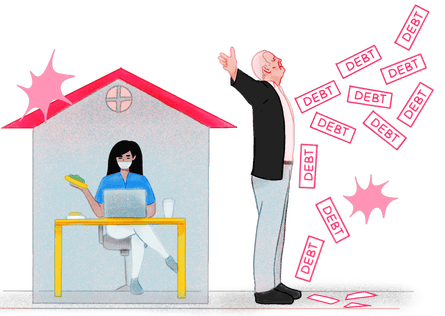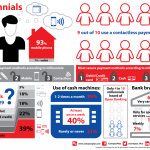
Vicki Buehler never thought she would own a home. By her mid-30s, her student loan balance had ballooned to $200,000 after she deferred payments, and she eventually went into default, leading to a subprime credit score. She was a workers’ comp attorney in Binghamton, New York, and earned about $60,000. “Having my own home was a pie in the sky dream,” she said.
This changed suddenly in 2021, when Buehler, a millennial, became part of a wave of homebuyers among Americans her age.
‘A place where millennials can own a home’: why doll’s houses are having a big momentRead more
Millennials, defined as those born roughly between 1981 and 1996, were once derided by some as the generation that spent too much on avocado toast to be able to afford a home. Many millennials said that instead of frivolous spending, they were hindered by fundamental economic disadvantages – such as stagnant wages and a housing affordability crisis – that their parents never had to contend with.
Now, however, millennials have achieved something remarkable: they have become a majority-homeowner group. In 2022, the share of millennials owning homes increased to 51.5%, according to a RentCafe analysis of census data. Their home ownership rates increased dramatically even in expensive metro areas such as New York and Los Angeles.
Have the life prospects of US millennials been misjudged – both by critics and by themselves?
Many millennials coming out of college faced poor job prospects and earnings after the global recession that began in 2007. Meanwhile income inequality worsened, and housing prices were rising faster than wages after 2010. “The economic hardships encountered at the start of their adulthood, coupled with student debt, resulted in millennials reaching homeownership later than other generations,” said Alexandra Both, a real estate writer and research analyst at the apartment list site RentCafe.
By age 30, just 42% of millennials owned homes, compared to 48% of gen Xers and 51% of baby boomers, an analysis of government data by Apartment List found. This gap persists into their early 40s, with the oldest millennials still having a lower rate of ownership than previous generations when they were that age.
Buehler said a mix of factors unexpectedly changed that helped her, and people in similar situations, get in a financial position to buy a house. Like many, she changed jobs during the pandemic and increased her pay. She also benefited from the emergency pause on student loan payments and was able to start putting away more in savings.
When her landlord asked if she would be interested in buying the duplex she had been renting for the last 10 years, Buehler was hesitant. “I had just started to claw my way out and build up what I would consider a decent savings account to cover months of my expenses,” she said. Buehler sought perspective from a real estate agent, who told her if she chose not to buy the house and move out, she should be prepared for higher rent as rates had increased to more than what she was paying. If she did buy, the agent said, she could rent out one unit to help pay the mortgage. A mortgage broker said despite her credit history, she qualified for a government-backed loan insured by the Federal Housing Administration, which requires a lower down payment.
During the summer of 2021, Buehler bought the duplex for about $160,000, putting down 3.5%, roughly $5,000. Her monthly mortgage payment including taxes and insurance is about $1,300, which she offsets with rental income of about $900. “Now, am I where I should be? Yes – or pretty close to it. But at the same time, I’m 40,” Buehler said. Next month, interest on her student student loans will resume. “Everything fell into place at the right time,” she said.
The right time, to put a point on it, being the rise of Covid-19. Student loan pauses and stimulus checks helped many people save more than they could have by cutting back on spending. First-time buyers also were aided by low mortgage interest rates – the average interest rate on a 30-year mortgage was 2.8% two years ago compared to 6.9% today – as well as high job turnover, and the mainstreaming of remote work that allowed people to move in with family or to areas with more affordable housing.
 View image in fullscreenSome new homeowners said they benefited from remote work policies that allowed them to buy in more affordable markets. Illustration: Ulises Mendicutty/The Guardian
View image in fullscreenSome new homeowners said they benefited from remote work policies that allowed them to buy in more affordable markets. Illustration: Ulises Mendicutty/The Guardian
“Some millennials did catch a break,” said Jessica Lautz, deputy chief economist and vice-president of research at the National Association of Realtors (NAR).
Fewer than one in five millennials received gifts from family and friends to help with their down payments, while others saved money by living with relatives and friends before buying, according to NAR data. Only a small percentage received inheritances.
Mary Weber, 33, was making about $80,000 as a hydrogeologist when she started thinking about buying a house. She said her financial anxiety had prevented her from considering it before. “As a millennial, employment wasn’t always guaranteed. I’ve seen jobs just dry up, and money dry up for my peers and people older than me,” she said. She stayed in her job for years but was constantly worried she would be let go, so she tried to save.
The pandemic stopped Weber from traveling and spending money going out. Her $387 monthly student loan payments were on hold. She grew her savings to about $18,000. Anxiety medication began to ease her wariness, including around home ownership. “I was like, oh, people buy houses in worse situations than me all the time, and they do just fine,” she said. “I think for once I felt like I had enough money to take care of myself. The pandemic broke my brain a little, and one good thing to come from that is I finally got over my bullshit enough to buy the house.”
Weber closed on a home in 2021 for $310,000. While her house only has one bathroom, she rents out rooms on Airbnb to help make her monthly mortgage payment of $1,700, giving her a sense of security she’s never had. “I know if I lost my job or got horribly sick, I wouldn’t be out of options,” she said.
Other new homeowners said they benefited from remote work policies that allowed them to buy in more affordable markets. Sharla Chamberlain, 35, had student loans and graduated into a difficult job market in 2010. She earned $11 an hour in her first internship in Washington DC. “I lost 25lbs in the six months I was living in DC because it was too hard to feed myself,” she said.
Just before the pandemic, she took advantage of her company’s remote work policy to move from San Francisco to the Denver area in January 2020. Her rent dropped to $1,600 for a one-bedroom from the $2,100 she had been paying for her studio in California (a rate she considered “an absolute steal” for the Bay Area), and she moved a year later to a two-bedroom apartment for $1,300. “I was making a good salary in San Francisco that translated well to Denver,” she said. Chamberlain doubled down on building her savings; she also got a new job where she could continue to work remotely, as well as several pay raises.
Return of rent control? How some US cities are trying to keep roofs over people’s headsRead more
By the time Chamberlain bought her house in the fall of 2022, her salary had increased to $134,000 and the housing market had cooled. Rising interest rates forced many potential buyers out of the market. Chamberlain bought her home for $457,000, about $20,000 less than the previous owner – a real estate tech company that was losing money – had bought it for, according to the property’s sale history, and she got a $9,000 credit for repairs. With taxes and insurance, her monthly mortgage payment is $2,900.
She also got a boost because approximately $35,000 of her student loan balance, about half, had been forgiven through a program offered through her university in Texas called the Texas B-On-Time loan, she said. It brought her monthly payment down to $116, and she was able to pay it off in six years and save more.
But turbulent times may be ahead for millennials. Experts say that the window of improved affordability may have already closed.
“They bought houses and they are active in the market,” said Lautz of the NAR, “just not at the rate that we should be seeing for this age category.” Housing affordability has declined steadily in 2023, according to the NAR, as has inventory, from 1.9m homes in June 2019 to 1m today. And this year, boomers are once again the largest group of homebuyers, often competing with millennials looking to buy their first home.
The personal savings rate is now 4.3% compared to an unusually high rate of 33.8% in April 2020. And Experian expects student loan payments – on pause during the pandemic – to resume in October at more than $200 a month on average.
Matt Kinghorn, a senior demographer at the Indiana Business Research Center at Indiana University, said the increase in home ownership among young adults over the last few years “could potentially be short-lived, driven by those really low mortgage interest rates and a surge in personal savings during the first year of the pandemic”.
Mary Weber feels guilty she bought a home while some of her friends continue to struggle. “I have a lot of friends who work really hard and aren’t able to work things out. I don’t know why I was able to do this and you weren’t,” she said. “I did work hard, absolutely, but also I happened to be aligned in specific ways that things worked out for me.”
Weber later left her employer for a job that paid less but that she enjoys more. “Things are a little bit precarious now, but, frankly, I don’t give a shit any more,” she said.

